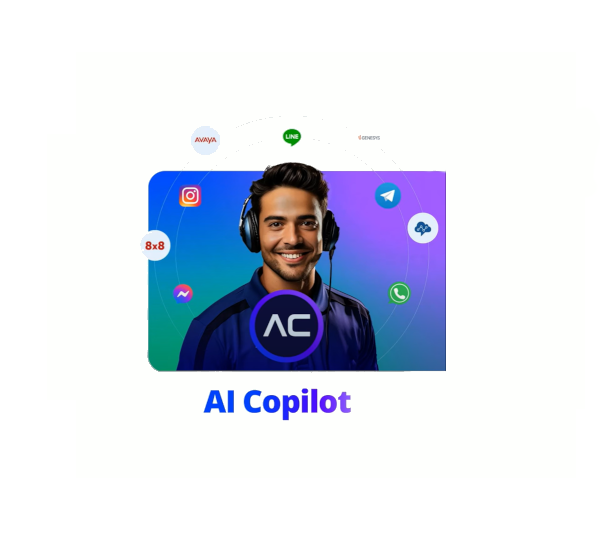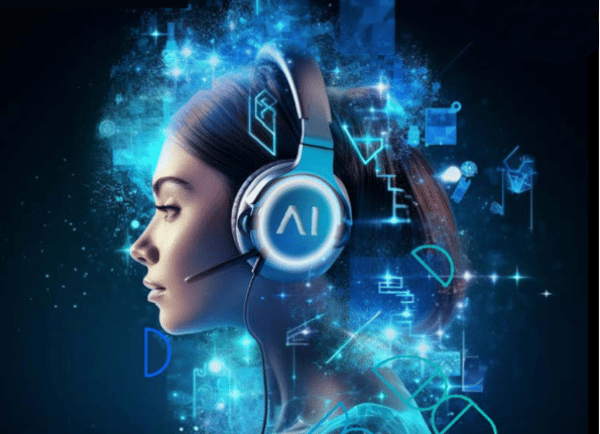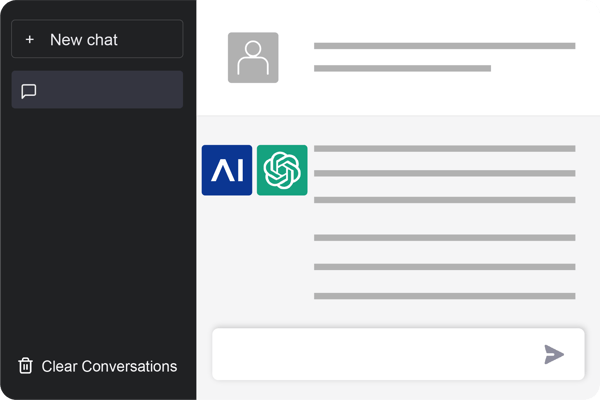Modern consumers crave immediacy. With technology like artificial intelligence (AI) and chatbots gaining ground, people expect solutions and services that are both personally tailored and delivered quickly. This increases pressure on companies to handle customer requests as fast and efficiently as possible.

That said, companies that do manage to harness the power of AI to improve their customer service will reap the rewards. AI, specifically Conversational AI, can enhance communication between companies and customers, boosting service and satisfaction — and ultimately increasing loyalty.
This guide to managing customer expectations in the age of artificial intelligence can help you make the most of these promising possibilities and avoid setting unrealistic expectations.
Artificial intelligence 101
Artificial intelligence generally refers to machines designed to respond to stimulation, consistent with responses that humans traditionally give. Advanced AI technology can display human-like capacities for judgment, intention, and contemplation.
AI-driven technologies can perform tasks like:
- Solve complex problems
- Understand different languages
- Create plans
- Recognize objects, faces, and sounds
Of course, that doesn't mean these machines are thinking and acting on their own. They've been programmed by people and run on complex algorithms. Chatbot technology — which is frequently used in customer service — is one example.
Chatbots are pre-programmed by a person to respond to certain keywords in specific ways. So, if a human user inputs the word "help," the chatbot might respond with, "What do you need help with?" Depending on the reply, the chatbot could point the human user in the direction of a proper online help channel, e.g., package tracking or payment problems.
A case study: The emergence of Conversational AI
AI has improved immensely in the last years, thanks to advances in computing and data-storage technology. Today's AI can handle far more complex tasks than in the past. The emergence of Conversational AI, a more intelligent version of chatbots, combines conversations and processes to help reduce repetitive tasks carried out by humans.
For example, Conversational AI has been used to carry out COVID-19 risk assessments during the coronavirus pandemic, minimizing the burden on overworked health professionals. AI-driven chatbots can even carry human-like conversations so people can engage more naturally. The result? People are now turning to bots to have someone to talk to in troubling times.
| Related Article |
These are just a couple of examples of the many ways that Conversational AI can help make human lives more comfortable. It can also be used for other purposes. Below, we focus on managing and setting realistic expectations towards the use of AI in customer service. We'll also explain how you can utilize Conversational AI to improve your service and give consumers the immediacy they demand.
The benefits of using AI to manage customer expectations
It's no secret that we are living in an "on-demand" culture. Online shopping is an excellent example of this. People used to order products online and would be happy if they arrived within a week. Today, when someone requests a product online, they expect businesses to ship it within days or even hours.
Consumers also want instant gratification when it comes to other sales funnel steps, like ordering, payment, and customer service. Here's how AI technology can help on all fronts.
Boost communicability
Good communication is one of the cornerstones of customer satisfaction. Consumers expect transparent and consistent communication. If they ask a question or need a problem solved, they expect an answer — fast! AI offers automated consumer service options, ensuring people's needs and requests are met as quickly as possible.
Modern AI can assist your human agents by filtering common requests, offering an effective first line of communication for consumers seeking assistance. Henkel’s “Stain-Bot” is a great example. The bot can safely identify over 2500 variations of substances, fabrics, and surfaces to calculate the exact treatment to eliminate stubborn stains.
Having such AI systems in place allows for more immediacy in customer service and builds trust. It also presents another advantage: An AI-driven chatbot can work 24 hours per day, seven days per week. Communication can occur at any time and consumers no longer have to wait on a long phone call or message to be answered days later.
Reduce customer service response times
Human agents need their rest, but AI will continue to run. This is important as customers might need help after office hours or because they are based in different time zones. Leave the customer waiting, and there's a good chance they will turn to another provider to get the service or product they want with extensive global coverage. After all, customers will leave after only one bad experience.
With Conversational AI at the helm of your customer service, you can significantly reduce slow response times without hiring more people in the team. The AI stays on top of all your channels and is ready to answer any customer questions and requests, 24/7.
This kind of AI-driven service is great for companies to help save costs and exceed customer expectations. Staffing a help center or outsourcing customer service to call centers can add up. Training human workers is also a costly and time-consuming expense. That won’t happen when Conversational AI is running the show.
This does not mean that customer service persons or contact center agents will become redundant. These jobs will remain in existence. Instead, chatbots will serve as the first-line response. Once issues get more complex, the problem can be escalated to a human representative. Of course, this escalation process can also be assisted by AI. See what a seamless chatbot to human agent handover looks like in the following video.
Use data to personalize the customer experience
Another significant benefit of AI-first customer service is that it allows for more personalized customer experiences. AI can store, read, and analyze large swathes of data. It makes it easier for companies and brands to understand who a consumer is and offer them tailored suggestions based on previous buying or browsing behavior.
For example, say a consumer buys a pair of shoes online via an e-commerce platform. An AI algorithm program could then be programmed to suggest other products that complement that purchase, such as socks or cleaning kits. It's a classic upsell technique — but in this case, it's driven by machines, not people.
The person may or may not choose to purchase the added product. However, it won't cost the company any added time or effort, as the upsell was fully automated and performed by AI. Of course, if the consumer does decide to purchase the suggested product, that means more money for the retailer.
This isn't just a question of a quick profit boost for the company. It's also about improving the overall consumer experience (and thereby driving loyalty). Consumers enjoy this sort of tailored shopping experience. Why? It's convenient. Technology is supposed to make people's lives easier.
Improve the possibilities for customers to help themselves
AI will also open up doors for customers to help themselves, making self-service more straightforward and accessible. Using tech like Conversational AI, people no longer have to rely on telephone hotlines staffed by human beings. They can simply start a conversation via the company’s webchat, social media, or even messaging apps like Facebook Messenger and WhatsApp.
This empowers consumers, giving them more personal agency over their role in the sales funnel. They don't even have to think hard about contacting you on which channel, they can just choose one that’s convenient for them at the time. And as a business, you don’t have to handle all these channels in silos. They are all integrated into a single Conversational AI platform for outstanding omnichannel experiences.
Automated customer service is the future of great customer service. Again, this doesn't mean that customer service positions for humans will disappear completely. Instead, a modern customer service funnel might start with a person helping themselves with the support of AI-driven chatbot technology. And if the issue can't be resolved in that manager, they turn to a human agent for help.
Managing customer expectations in the age of artificial intelligence with a Conversational AI platform
There are some challenges to managing customer expectations in the age of artificial intelligence. It's critical to recognize the modern consumers' demand for immediacy and to meet this demand. People want fast service at every stage of their customer journey, from the ordering process to payment, and delivery to customer service.
Artificial intelligence technology such as Conversational AI can help businesses meet — and even exceed — those demands. Companies can tap into AI's power to boost communication, improve customer service response times, personalize the customer experience, and even open possibilities for customer self-service.
That leaves us with two questions: How do you know which Conversational AI platform to choose and what kind of return on investment (ROI) can you expect?
Our Conversational AI platform, Cognigy.AI, comes with a 30-day free trial so you can build and deploy virtual agents as fast as possible. Its graphical conversations editor lets you design conversations without any coding, and you can also test and train the AI in real-time. This means you can speed up the process from designing to deploying a virtual agent. No time for a free trial? Book a free demo with one of our experts so we can show you how a Conversational AI platform can unlock your company’s full potential.
If your customer support relies on telephone channels and does not wish to go the chatbot route yet, fret not. Cognigy.AI is equipped with advanced voice capabilities that let you cut your average handle time (AHT) by 15 seconds, saving your call center cost of up to $400,000/year.*

.png?width=60&height=60&name=AI%20Copilot%20logo%20(mega%20menu).png)




.png?width=600&height=600&name=Knowledge%20AI%20Feature%20image%20(2).png)















